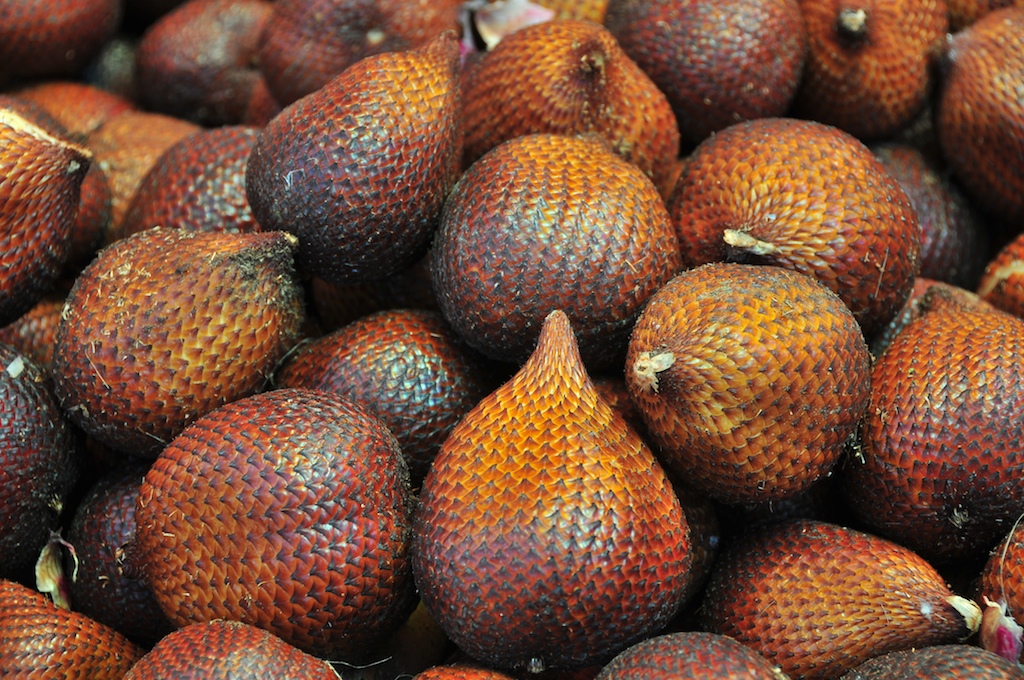17 Amazing Health Benefits of Salak Fruit

Salak fruit, also known as snake fruit due to its reddish-brown scaly skin, is a tropical fruit native to Indonesia and parts of Southeast Asia. This intriguing fruit, which grows on the Salacca zalacca palm tree, is not only known for its unique appearance but also for its sweet, tangy, and slightly acidic taste. Beneath its rough exterior, salak fruit offers a treasure trove of nutrients and health benefits that make it a valuable addition to a balanced diet.
Rich in vitamins, minerals, antioxidants, and fiber, salak fruit has been used in traditional medicine for centuries. Its potent combination of nutrients offers a range of health benefits, from improving digestion to supporting heart health. In this article, we’ll explore the 17 amazing health benefits of salak fruit and how it can enhance your overall well-being.
1. Rich in Antioxidants
Salak fruit is packed with antioxidants, including beta-carotene and flavonoids, which help protect the body from oxidative stress caused by free radicals. Free radicals are unstable molecules that can damage cells and contribute to aging and the development of chronic diseases like heart disease and cancer. The antioxidants in salak fruit neutralize these harmful molecules, reducing oxidative damage and promoting better overall health.
By consuming antioxidant-rich foods like salak fruit, you can help protect your body from the effects of oxidative stress, reduce inflammation, and support long-term health.
2. Improves Eye Health
Salak fruit is a rich source of beta-carotene, a precursor to vitamin A, which is essential for maintaining healthy eyes and preventing vision-related issues. Beta-carotene plays a critical role in protecting the eyes from oxidative damage, especially from UV rays, and helps prevent age-related conditions like macular degeneration and cataracts.
Regular consumption of salak fruit can support better night vision, reduce the risk of vision loss, and protect the eyes from oxidative damage. Including salak fruit in your diet is a natural way to boost eye health and preserve your vision as you age.
3. Promotes Digestive Health
Salak fruit is high in dietary fiber, which plays a crucial role in promoting digestive health and preventing common digestive issues like constipation and bloating. Fiber adds bulk to the stool, making it easier to pass through the digestive tract, and helps regulate bowel movements.
The fiber content in salak fruit also supports the growth of beneficial gut bacteria, which are essential for maintaining a healthy gut microbiome. A balanced gut microbiome is linked to improved digestion, better nutrient absorption, and a stronger immune system.
By incorporating salak fruit into your diet, you can support healthy digestion and reduce the risk of digestive disorders.
4. Aids in Weight Loss
Salak fruit is a low-calorie food that is rich in fiber and water content, making it an excellent addition to a weight loss diet. The high fiber content in salak fruit helps promote a feeling of fullness, reducing the likelihood of overeating and aiding in weight management.
The fiber in salak fruit also slows down the digestion of carbohydrates, preventing rapid spikes in blood sugar and promoting stable energy levels. This can help prevent cravings and keep you feeling satisfied for longer periods of time.
Including salak fruit as a healthy snack can support weight loss efforts by curbing hunger and reducing calorie intake.
5. Boosts Energy Levels
Salak fruit is a great source of carbohydrates, which are the body’s primary source of energy. The natural sugars in salak fruit provide a quick and sustained energy boost, making it an ideal snack for people who need an energy pick-me-up during the day.
In addition to carbohydrates, salak fruit contains potassium, a mineral that helps regulate muscle function and energy production. Potassium is essential for maintaining proper fluid balance in the body and ensuring that cells function optimally.
Eating salak fruit as part of a balanced diet can help boost energy levels, improve physical performance, and reduce fatigue.
6. Supports Heart Health
The nutrients in salak fruit, including potassium, fiber, and antioxidants, make it a heart-healthy food. Potassium helps regulate blood pressure by balancing the effects of sodium in the body and relaxing blood vessel walls, which improves circulation and reduces strain on the heart.
Additionally, the fiber in salak fruit helps lower cholesterol levels by binding to cholesterol in the digestive tract and preventing its absorption into the bloodstream. This can help reduce the risk of heart disease and support overall cardiovascular health.
By incorporating salak fruit into your diet, you can support healthy blood pressure levels, improve cholesterol balance, and reduce the risk of cardiovascular problems.
7. Regulates Blood Sugar Levels
Despite its sweet taste, salak fruit has a low glycemic index, meaning it doesn’t cause rapid spikes in blood sugar levels. The fiber content in salak fruit helps slow down the absorption of sugar into the bloodstream, preventing sudden increases in blood glucose and insulin levels.
This makes salak fruit a great option for people with diabetes or those looking to manage their blood sugar levels. Eating foods with a low glycemic index can help stabilize energy levels, reduce cravings, and support better blood sugar control.
Including salak fruit in a balanced diet can help regulate blood sugar and reduce the risk of developing insulin resistance and type 2 diabetes.
8. Enhances Cognitive Function
Salak fruit is often referred to as “memory fruit” due to its ability to improve cognitive function and memory. The fruit contains potassium and beta-carotene, both of which are important for brain health and cognitive performance. Potassium helps maintain proper fluid balance in the brain, supporting optimal nerve function and communication.
The antioxidants in salak fruit, including flavonoids and beta-carotene, help protect brain cells from oxidative damage and reduce inflammation, which are both linked to cognitive decline and neurodegenerative diseases like Alzheimer’s and Parkinson’s.
Regular consumption of salak fruit can help improve memory, enhance concentration, and protect the brain from age-related cognitive decline.
9. Strengthens the Immune System
Salak fruit is rich in vitamin C, a powerful antioxidant that plays a critical role in supporting the immune system. Vitamin C helps stimulate the production of white blood cells, which are essential for fighting off infections and pathogens. It also helps protect immune cells from oxidative damage, ensuring that the immune system functions optimally.
In addition to vitamin C, salak fruit contains other antioxidants that help reduce inflammation and protect the body from illness. Consuming salak fruit regularly can help strengthen your immune defenses and reduce the risk of infections, colds, and other illnesses.
10. Promotes Healthy Skin
The high content of antioxidants and vitamin C in salak fruit makes it a great food for promoting healthy, glowing skin. Antioxidants help protect the skin from oxidative damage caused by free radicals, which can lead to premature aging, wrinkles, and fine lines.
Vitamin C is essential for the production of collagen, a protein that maintains the skin’s elasticity and firmness. Regular consumption of salak fruit can help improve skin texture, reduce the appearance of wrinkles, and promote a youthful complexion.
Incorporating salak fruit into your diet can provide your skin with the nutrients it needs to stay healthy and radiant.
11. Supports Bone Health
Salak fruit contains several nutrients that are important for maintaining strong and healthy bones, including calcium, phosphorus, and potassium. These minerals work together to promote bone density, strengthen the skeletal system, and reduce the risk of bone-related disorders like osteoporosis.
Calcium and phosphorus are essential for bone mineralization, while potassium helps balance calcium levels in the body, preventing excessive calcium loss through urine. Regular consumption of salak fruit can help support bone health and reduce the risk of fractures and bone loss as you age.
12. Promotes Healthy Metabolism
Salak fruit is rich in B vitamins, particularly B2 (riboflavin) and B3 (niacin), which play a crucial role in supporting a healthy metabolism. These vitamins help the body convert carbohydrates, fats, and proteins into energy, ensuring that cells function properly and efficiently.
A healthy metabolism is essential for maintaining energy levels, regulating weight, and supporting overall well-being. Consuming foods rich in B vitamins, like salak fruit, can help improve metabolic function and support healthy weight management.
13. Improves Respiratory Health
Salak fruit contains several nutrients, including vitamin C and antioxidants, that help support respiratory health and protect the lungs from oxidative damage. The anti-inflammatory properties of these nutrients can help reduce inflammation in the airways and improve lung function, making it easier to breathe.
For individuals with asthma or other respiratory conditions, consuming antioxidant-rich foods like salak fruit can help reduce symptoms and improve overall lung health.
14. Supports Healthy Pregnancy
Salak fruit is a good source of essential nutrients that support a healthy pregnancy, including folic acid, calcium, and iron. Folic acid is especially important for pregnant women, as it helps prevent neural tube defects in developing babies.
Additionally, the iron content in salak fruit supports healthy red blood cell production, preventing anemia during pregnancy. Consuming nutrient-dense fruits like salak can help ensure that both the mother and baby receive the nutrients they need for a healthy pregnancy.
15. Reduces Stress and Anxiety
Salak fruit contains potassium and magnesium, two minerals that are essential for regulating stress hormones and promoting relaxation. Potassium helps balance the effects of cortisol, the body’s primary stress hormone, while magnesium supports muscle relaxation and improves sleep quality.
Including salak fruit in your diet can help reduce feelings of stress and anxiety, improve mood, and promote better overall mental health.
16. Boosts Heart Health
The fiber, antioxidants, and potassium in salak fruit all work together to support heart health. Fiber helps reduce LDL cholesterol levels, preventing plaque buildup in the arteries and reducing the risk of heart disease.
Potassium helps regulate blood pressure by balancing sodium levels and relaxing blood vessels, improving circulation and reducing the strain on the heart. Antioxidants in salak fruit help protect the heart from oxidative stress and inflammation, further promoting cardiovascular health.
Consuming salak fruit regularly can help protect the heart and reduce the risk of cardiovascular conditions like hypertension, heart attacks, and stroke.
17. Fights Inflammation
The antioxidants and anti-inflammatory compounds found in salak fruit help reduce inflammation throughout the body. Chronic inflammation is a major contributor to many health conditions, including arthritis, heart disease, and diabetes.
By reducing inflammation, salak fruit can help protect against these diseases and improve overall health. Regular consumption of anti-inflammatory foods like salak fruit can promote long-term well-being and reduce the risk of chronic diseases.
Conclusion
Salak fruit is a nutrient-dense and versatile fruit that offers a wide range of health benefits. From supporting heart health and improving digestion to promoting healthy skin and enhancing cognitive function, salak fruit is a valuable addition to a balanced diet. Its rich content of antioxidants, fiber, and essential vitamins and minerals makes it an excellent choice for improving overall health and reducing the risk of chronic diseases.
Incorporating salak fruit into your diet can provide natural support for a variety of health goals, making it a delicious and health-boosting snack option for people of all ages.


